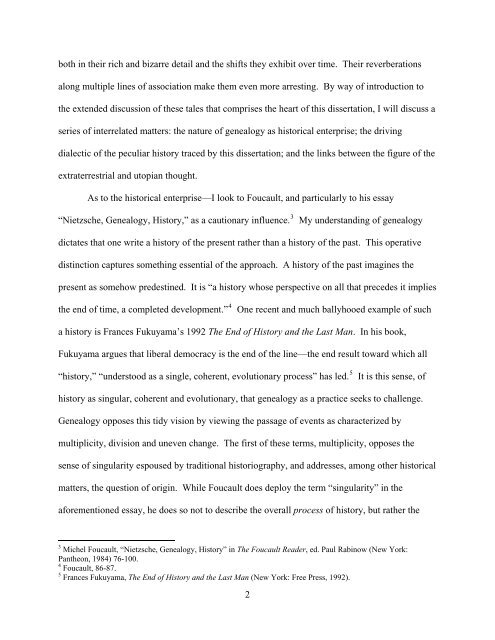A Genealogy of the Extraterrestrial in American Culture
A Genealogy of the Extraterrestrial in American Culture
A Genealogy of the Extraterrestrial in American Culture
Create successful ePaper yourself
Turn your PDF publications into a flip-book with our unique Google optimized e-Paper software.
oth <strong>in</strong> <strong>the</strong>ir rich and bizarre detail and <strong>the</strong> shifts <strong>the</strong>y exhibit over time. Their reverberations<br />
along multiple l<strong>in</strong>es <strong>of</strong> association make <strong>the</strong>m even more arrest<strong>in</strong>g. By way <strong>of</strong> <strong>in</strong>troduction to<br />
<strong>the</strong> extended discussion <strong>of</strong> <strong>the</strong>se tales that comprises <strong>the</strong> heart <strong>of</strong> this dissertation, I will discuss a<br />
series <strong>of</strong> <strong>in</strong>terrelated matters: <strong>the</strong> nature <strong>of</strong> genealogy as historical enterprise; <strong>the</strong> driv<strong>in</strong>g<br />
dialectic <strong>of</strong> <strong>the</strong> peculiar history traced by this dissertation; and <strong>the</strong> l<strong>in</strong>ks between <strong>the</strong> figure <strong>of</strong> <strong>the</strong><br />
extraterrestrial and utopian thought.<br />
As to <strong>the</strong> historical enterprise—I look to Foucault, and particularly to his essay<br />
“Nietzsche, <strong>Genealogy</strong>, History,” as a cautionary <strong>in</strong>fluence. 3<br />
My understand<strong>in</strong>g <strong>of</strong> genealogy<br />
dictates that one write a history <strong>of</strong> <strong>the</strong> present ra<strong>the</strong>r than a history <strong>of</strong> <strong>the</strong> past. This operative<br />
dist<strong>in</strong>ction captures someth<strong>in</strong>g essential <strong>of</strong> <strong>the</strong> approach. A history <strong>of</strong> <strong>the</strong> past imag<strong>in</strong>es <strong>the</strong><br />
present as somehow predest<strong>in</strong>ed. It is “a history whose perspective on all that precedes it implies<br />
<strong>the</strong> end <strong>of</strong> time, a completed development.” 4<br />
One recent and much ballyhooed example <strong>of</strong> such<br />
a history is Frances Fukuyama’s 1992 The End <strong>of</strong> History and <strong>the</strong> Last Man. In his book,<br />
Fukuyama argues that liberal democracy is <strong>the</strong> end <strong>of</strong> <strong>the</strong> l<strong>in</strong>e—<strong>the</strong> end result toward which all<br />
“history,” “understood as a s<strong>in</strong>gle, coherent, evolutionary process” has led. 5<br />
It is this sense, <strong>of</strong><br />
history as s<strong>in</strong>gular, coherent and evolutionary, that genealogy as a practice seeks to challenge.<br />
<strong>Genealogy</strong> opposes this tidy vision by view<strong>in</strong>g <strong>the</strong> passage <strong>of</strong> events as characterized by<br />
multiplicity, division and uneven change. The first <strong>of</strong> <strong>the</strong>se terms, multiplicity, opposes <strong>the</strong><br />
sense <strong>of</strong> s<strong>in</strong>gularity espoused by traditional historiography, and addresses, among o<strong>the</strong>r historical<br />
matters, <strong>the</strong> question <strong>of</strong> orig<strong>in</strong>. While Foucault does deploy <strong>the</strong> term “s<strong>in</strong>gularity” <strong>in</strong> <strong>the</strong><br />
aforementioned essay, he does so not to describe <strong>the</strong> overall process <strong>of</strong> history, but ra<strong>the</strong>r <strong>the</strong><br />
3 Michel Foucault, “Nietzsche, <strong>Genealogy</strong>, History” <strong>in</strong> The Foucault Reader, ed. Paul Rab<strong>in</strong>ow (New York:<br />
Pan<strong>the</strong>on, 1984) 76-100.<br />
4 Foucault, 86-87.<br />
5 Frances Fukuyama, The End <strong>of</strong> History and <strong>the</strong> Last Man (New York: Free Press, 1992).<br />
2















